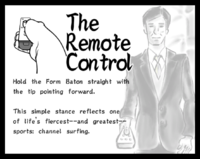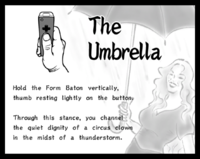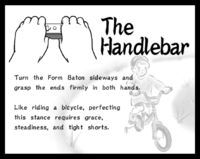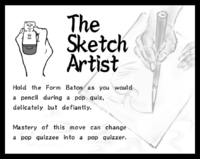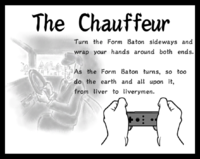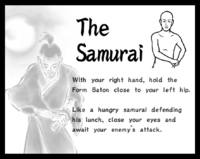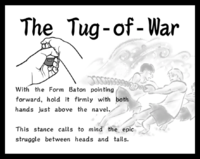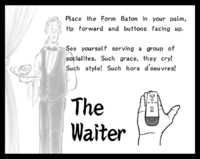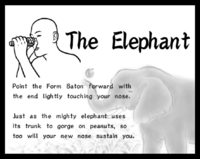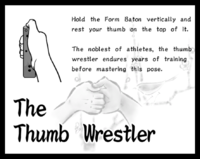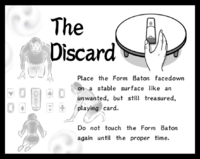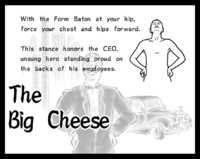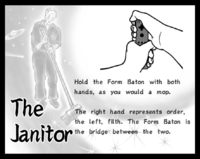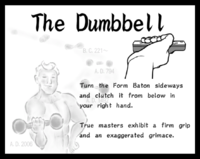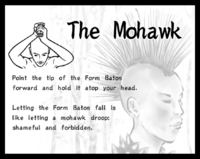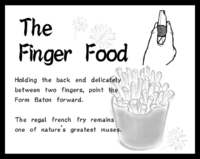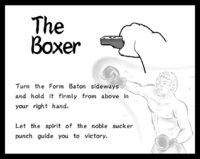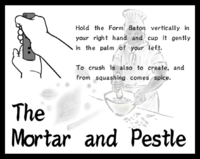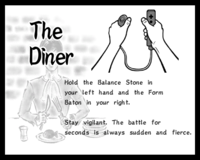Form Baton: Difference between revisions
m (Adding a few trivia tidbits) |
No edit summary |
||
| Line 846: | Line 846: | ||
|Jap=岡っ引き | |Jap=岡っ引き | ||
|JapR=Okappiki | |JapR=Okappiki | ||
|JapM= | |JapM=Hawkshaw | ||
|Spa=El boxeador | |Spa=El boxeador | ||
|SpaM=The boxer | |SpaM=The boxer | ||
Revision as of 20:10, March 5, 2017
The Form Baton is the most important object in WarioWare: Smooth Moves. Wario stumbled in on this mysterious device in a place called the Temple of Form. He soon finds out that how one uses it depends on the way one holds it. Then, he goes off and shares it with his friends at WarioWare. It turns out that the Form shown is how the player must use the Wii Remote to play the game (in-game instructions actually refer to the Wii Remote as the "Form Baton"). The Form Baton also has a Nunchuk counterpart, the Balance Stone, shown in the final stage of the game.
Forms
Forms, as the name implies, are the modes of holding the ![]() Form Baton (Wii Remote) in WarioWare: Smooth Moves. The forms are introduced by the Form Explanation, which acts as an often comedic tutorial of how to use each form. Each form is used for certain microgames in the game. Below is a list of forms (and compatible microgames) in order of their appearance:
Form Baton (Wii Remote) in WarioWare: Smooth Moves. The forms are introduced by the Form Explanation, which acts as an often comedic tutorial of how to use each form. Each form is used for certain microgames in the game. Below is a list of forms (and compatible microgames) in order of their appearance:
The Remote Control
Appears in
In-game text
- Description: "This is the most basic and popular of all the forms."
- Form Explanation: Hold the Form Baton straight with the tip pointing forward.
This simple stance reflects one of life's fiercest--and greatest--sports: channel surfing.
Microgames
Names in other languages
The Umbrella
- This section is about the form in WarioWare: Smooth Moves. For information about the object in Yoshi's Story, see here.
Appears in
In-game text
- Description: "After the Remote Control, this is the second-most-popular form."
- Form Explanation: Hold the Form Baton vertically, thumb resting lightly in the button.
Through this stance, you channel the quiet dignity of a circus clown in the midst of a thunderstorm.
Microgames
Names in other languages
The Handlebar
Appears in
In-game text
- Description: "This is the most balanced form. Most Handlebar games require quick movements."
- Form Explanation: Turn the Form Baton sideways and grasp the ends firmly in both hands.
Like riding a bicycle, perfecting this stance requires grace, steadiness, and tight shorts.
Microgames
Names in other languages
The Sketch Artist
Appears in
|
In-game text
- Description: "This form is best suited for movements requiring precision. Use your dominant hand to perform this form."
- Form Explanation: Hold the Form Baton as you would a pencil during a pop quiz, delicately but defiantly.
Mastery of this move can change a pop quizee into a pop quizzer.
Microgames
Names in other languages
The Chauffeur
Appears in
- Description: "This form is best suited for gyrating movements."
- Form Explanation: Turn the Form Baton sideways and wrap your hands around both ends.
As the Form Baton turns, so too do the earth and all upon it, from liver to liverymen.
Microgames
Names in other languages
The Samurai
Appears in
- Description: "You can feel the spirit of the samurai in this form. It's said that your breathing affects the outcome."
- Form Explanation: With your right/left hand, hold the Form Baton close to your left/right hip.
Like a hungry samurai defending his lunch, close your eyes and await your enemy's attack.
Microgames
Names in other languages
The Tug-of-War
- Description: "This form has been taught from generation to generation. Lately, the tend has been to bring the hands closer together."
- Form Explanation: With the Form Baton pointing forward, hold it firmly with both hands just above the navel.
This stance calls to mind the epic struggle between heads and tails.
Microgames
Names in other languages
The Waiter
- Description: "It's very easy to drop the Form Baton when performing this form, so be careful."
- Form Explanation: Place the Form Baton in your palm, tip forward and buttons facing up.
See yourself serving a group of socialites. Such grace, they cry! Such style! Such hors d'oeuvres!
Microgames
Names in other languages
The Elephant
In-game text
- Description: "This form will make your nose look longer, but the point is to make it look appealing."
- Form Explanation: Hold the Form Baton forward with the end lightly touching your nose.
Just as the mighty elephant uses its trunk to gorge on peanuts, so too will your new nose sustain you.
Microgames
Names in other languages
The Thumb Wrestler
In-game text
- Description: "This relatively new form is actually an evolved version of the Umbrella. Is it just me, or does the evolution seem like a minor one?"
- Form Explanation: Hold the Form Baton vertically and rest your thumb on the top of it.
The noblest of athletes, the thumb wrestler endures years of training before mastering this pose.
Microgames
Names in other languages
The Discard
In-game text
- Description: "It's helpful to have a flat surface nearby when playing these games."
- Form Explanation: Place the form baton facedown on a stable surface like an unwanted, but still treasured, playing card.
Do not touch the Form Baton again until the proper time.
Microgames
|
Names in other languages
The Big Cheese
In-game text
- Description: "Show-offs are quick to learn this form. However, that does not mean they do it well."
- Form Explanation: With the Form Baton at your hip, force your chest and hips foward.
This stance honors the CEO, unsung hero standing proud on the backs of his employees.
Microgames
Names in other languages
The Janitor
In-game text
- Description: "This form is as hardworkng and effective as its name implies. Little-known fact: the Janitor is just the Tug-of-War turned upright."
- Form explanation: Hold the Form Baton with both hands, as you would a mop.
The left/right hand represents order, the right/left, filth. The Form Baton is the bridge between the two.
Microgames
|
Names in other languages
The Dumbbell
In-game text
- Decription: "This is an easy way to hold the Form Baton, and it provides a satisfying weight in your palm."
- Form Explanation: Turn the Form Baton sideways and clutch it from below in your right/left hand.
True Masters exhibit a firm grip and an exaggerated grimace.
Microgames
Names in other languages
The Mohawk
In-game text
- Description: "Games that use this form require whole-body movement. It might be a bit of a challenge for players who have not exercised in a while."
- Form Explanation: Point the tip of the Form Baton foward and hold it atop your head.
Letting the Form Baton fall is like letting a mohawk droop: shameful and forbidden.
Microgames
Names in other languages
The Finger Food
In-game text
- Description: "This form requires fingertip strength and control. It's best suited for relatively uncomplicated games."
- Form Explanation: Holding the back end delicately between two fingers, point the Form Baton foward.
The regal french fry remains one of nature's greatest muses.
Microgames
Names in other languages
The Boxer
In-game text
- Description: "Compared to the other forms, this is the most relaxed way of holding the Form Baton."
- Form Explanation: Turn the Form Baton and hold it firmly from above in your right/left hand.
Let the spirit of the noble sucker punch guide you to victory.
Microgames
Names in other languages
The Mortar and Pestle
In-game text
- Description: "This form is interesting because it places much responsibility on the non-dominant hand, the left/right hand."
- Form explanation: Hold the Form Baton vertically in your right/left hand and cup it gently in the palm of your left/right
To crush is also to create, and from squashing comes spice.
Microgames
Names in other languages
The Diner
In-game text
- Description: "You need the Balance Stone for this form. There are actually three versions of the Diner."
- Form Explanation: Hold the Balance Stone in your left/right hand and the Form Baton in your right/left.
Stay vigilant. The battle for seconds is always sudden and fierce.
Modes
- A: Point the
 and the
and the  up.
up. - B: Point the
 and the
and the  foward.
foward. - C: Point the
 and the
and the  to each other.
to each other.
Microgames
|
|
|
|
|
|
Names in other languages
Trivia
- The way that Wario takes the Form Baton is similar to one of the events from the movie Indiana Jones and the Raiders of the Lost Ark, in which Indiana Jones takes the golden idol out of the Lost Temple and gets chased by a boulder, one of the temple's obstacles.
- The Spanish version of The Elephant form explanation states that this form is used as a "punishment for liars", a reference to Pinocchio.
- Japan's original version of The Boxer, The Chauffeur, The Diner, The Discard, The Elephant, The Finger Food, The Handlebar, The Janitor, The Remote Control, The Mohawk, The Mortar and Pestle, The Sketch Artist, The Umbrella, and The Waiter were related to Japanese culture.
- The Boxer was changed from Detective, referring to Okappiki, an type of detective from the Edo era of Japan.
- The Chauffeur was originally based on a traditional Japanese dance called Mawaryanse, which involves holding hands.
- The Diner was originally based on the concept of dual-wielding weapons.
Names in other languages
Template:Foreignname Template:BoxTop
